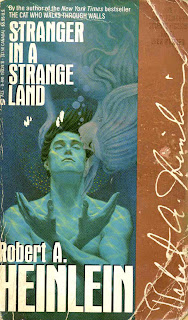Stranger in a Strange Land

My latest book from the library is (the audio version of) Stranger in a Strange Land (ref. Exodus 2:22:) by Robert Heinlein. I read the book once when I was a teen and I was impressed and also disturbed by it. I'm interested to see if it affects me the same way this time as it did before.
The book, which won a Hugo award for best novel, is set a bit in the future and is about Valentine Michael Smith, a child born on Mars to astronauts on a first-contact mission from Earth. All the astronauts die, leaving Smith to be raised by Martians. Twenty years later another expedition reaches Mars and brings Smith to Earth. For all intents and purposes, Smith is a Martian in a human body, suffering under a heavier gravity, a poor understanding of English, and an almost total lack of knowledge of humanity, including the fact of the existence of women. Being the only survivor of the first mission to Mars, he's inherited immense wealth and the government wants his money, so his nurse breaks him out of the hospital and spirits him to Jubal Harshaw, a wealthy and famous author/lawyer/doctor/libertarian/agnostic, who takes him under his wing.
The interesting thing about Stranger in a Strange Land is the way Smith thinks. Raised by Martians ....
Smith understands the concept of God only as "one who groks", which includes every living person, plant, and animal. This leads him to express the Martian concept of the oneness of life as the phrase "Thou art God". Many other human concepts—such as war, clothing, and jealousy—are strange to him, while the idea of an afterlife is something he takes as a given because the government on Mars is composed of "Old Ones", the spirits of Martians who have died. It is also customary for loved ones and friends to eat the bodies of the dead, in a spirit of Holy Communion.
Eventually Smith starts a new religion, the Church of All Worlds, which teaches the Martian language and psychic ability, practices polyamory, and exhibits many elements of mystery cults. It's attacked by the prevailing and powerful Fosterite religion as blasphemous, and before long Smith and his followers are wanted by the police. He ends up being killed by an angry mob, is eaten by his followers in a religious ceremony (sound familiar?), and then continues to exist in spiritual form as an advisor to his community.
As Wikipedia states ... "Stranger" was written in part as a deliberate attempt to challenge social mores. In the course of the story, Heinlein uses Smith's open-mindedness to reevaluate such institutions as religion, money, monogamy, and the fear of death. This can be challenging, but I think this is one of the best attributes of science fiction - it ivites us to look again at stuff we take for granted.
You can listen to an audio sample from the beginning of the book at Audible.com here.


4 Comments:
Wow! Haven't read that one in years! Classic! Letusknow how you feel about it this time, when you're done.
Hi Denny,
So far the writing is better than I remember it being. I really liked Heinlein back then - read Starship Troopers and The Moon is a Harsh Mistress and some others of his.
I think over the years I have read most of Heinlein's books and have enjoyed them.
I do have some problems with his philosophy that men should be super macho, all women "loving". I agree that all of us need to become more self sufficient, but I think he carries it a bit to the extreme.
And I always enjoyed his books.
Hugs,
Mike L
Hi Mike,
Yeah I think that's part of what I found disturbing when I read the book before - the relationships between the men and women. I haven't gotten to that part yet, so maybe I'm not remembering it correctly, though.
Post a Comment
<< Home